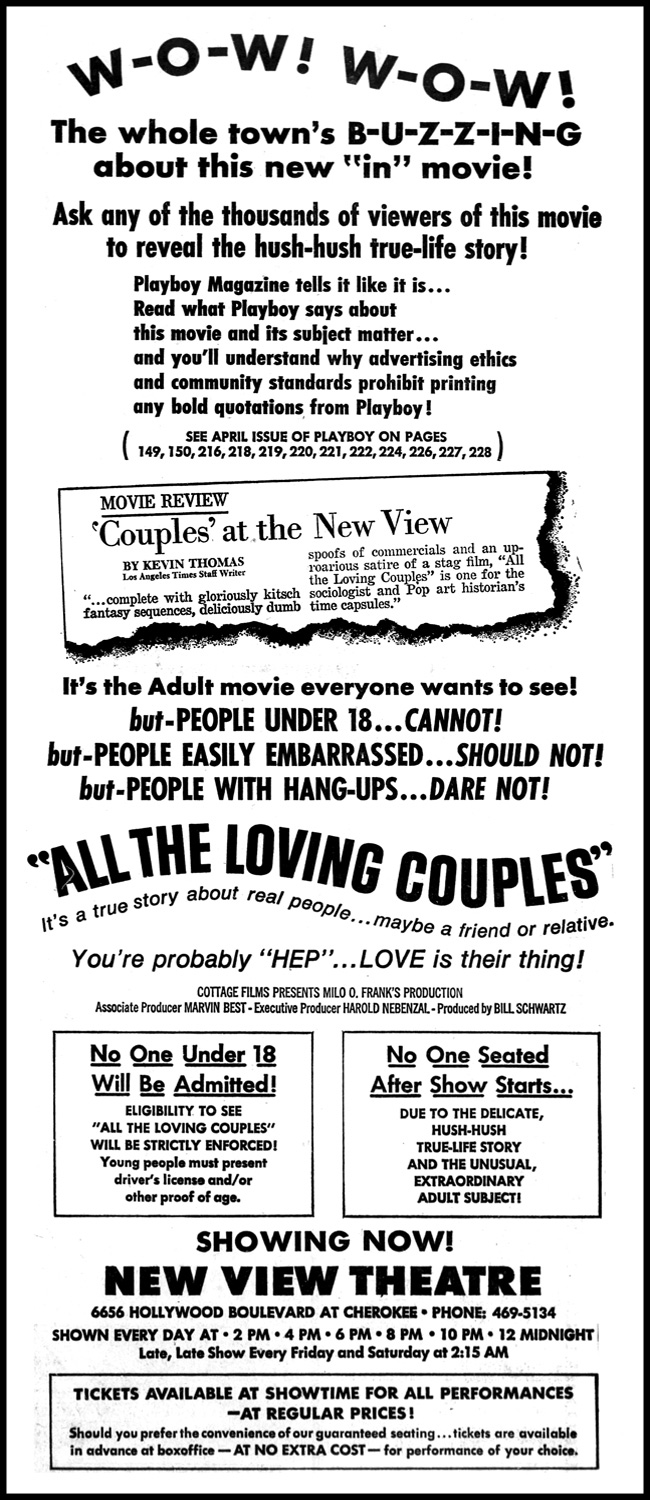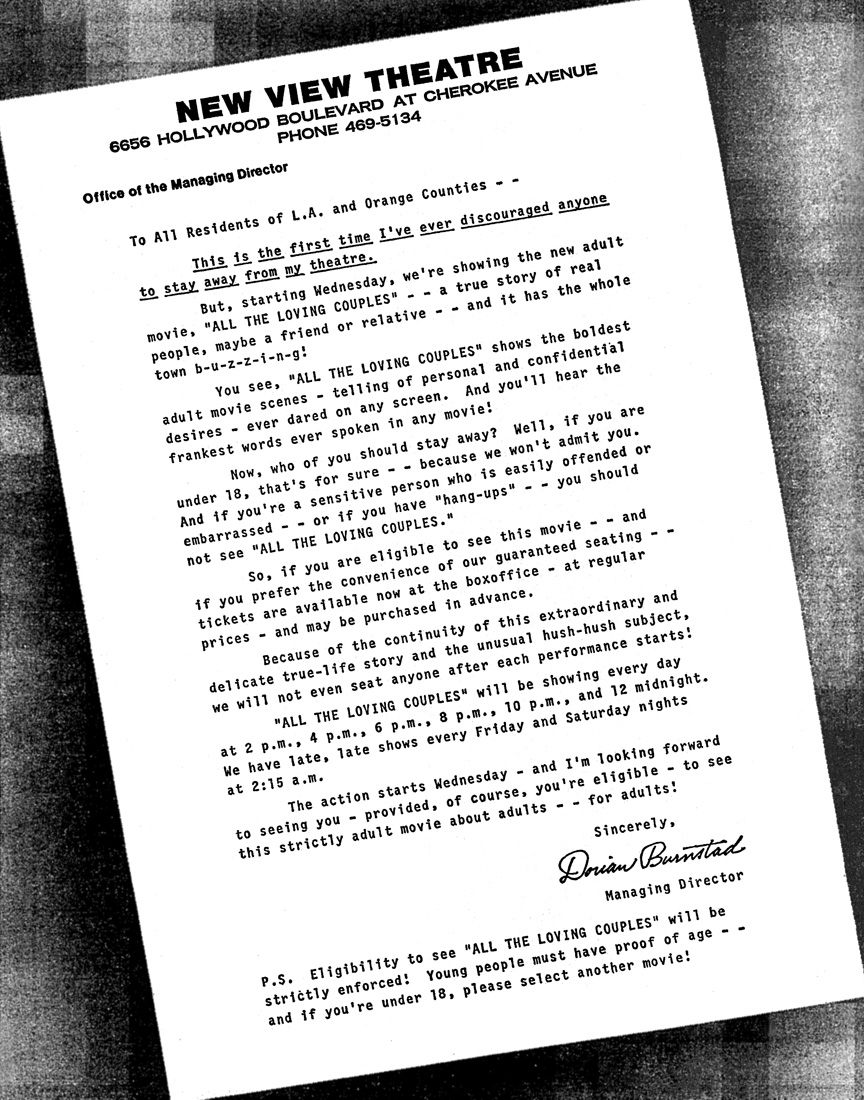|
ALL THE LOVING COUPLES (1969).
 Premiering six months before Paul Mazursky's BOB & CAROL & TED & ALICE turned suburban wife-swapping into a mainstream curiosity, this substantially lower-budgeted take on the sexual revolution focuses on one evening with four married couples in comfortably affluent Encino, California. But first-time feature director Mack Bing (previously an associate producer on ABC-TV's 1963 THE JERRY LEWIS SHOW and NBC's 1966 THE SAMMY DAVIS JR. SHOW) and tough-guy-character-actor-turned-scriptwriter Leo V. Gordon had slightly loftier aspirations than run-of-the-mill sexploitation, with this unexpectedly insightful story exposing the underlying emptiness and confusion of its swinging characters... Mitch Burnett (Norman Alden) and wife Liz (Gloria Manon, THE WOMAN INSIDE) are having an intimate little Friday night 'couples get-together' at their home. The guest list includes Irv (Paul Lambert) and statuesque ex-showgirl Natalie (Lynn Cartwright -- scriptwriter Gordon's wife, who also appeared in earlier films penned by her husband, including THE WASP WOMAN and THE CRY BABY KILLER); Mike (Paul Comi) brings the stag films, while wife Thelma (Jackie Russell) arrives in a new mink, high heels and nothing else; plus nervous first-timers Dale (Scott Graam) and Kathy (Barbara Blake). Once the introductions are out of the way, the liquor begins to flow, the women try on cheesy costumes -- Natalie in black leather dominatrix gear, Thelma dresses like a sexy nurse, Kathy puts on a schoolgirl outfit -- while the men simply slip into shorty bathrobes, and they play spin the bottle to see who pairs up together. It also becomes clear that success-driven Dale is only here to make new business contacts,
Premiering six months before Paul Mazursky's BOB & CAROL & TED & ALICE turned suburban wife-swapping into a mainstream curiosity, this substantially lower-budgeted take on the sexual revolution focuses on one evening with four married couples in comfortably affluent Encino, California. But first-time feature director Mack Bing (previously an associate producer on ABC-TV's 1963 THE JERRY LEWIS SHOW and NBC's 1966 THE SAMMY DAVIS JR. SHOW) and tough-guy-character-actor-turned-scriptwriter Leo V. Gordon had slightly loftier aspirations than run-of-the-mill sexploitation, with this unexpectedly insightful story exposing the underlying emptiness and confusion of its swinging characters... Mitch Burnett (Norman Alden) and wife Liz (Gloria Manon, THE WOMAN INSIDE) are having an intimate little Friday night 'couples get-together' at their home. The guest list includes Irv (Paul Lambert) and statuesque ex-showgirl Natalie (Lynn Cartwright -- scriptwriter Gordon's wife, who also appeared in earlier films penned by her husband, including THE WASP WOMAN and THE CRY BABY KILLER); Mike (Paul Comi) brings the stag films, while wife Thelma (Jackie Russell) arrives in a new mink, high heels and nothing else; plus nervous first-timers Dale (Scott Graam) and Kathy (Barbara Blake). Once the introductions are out of the way, the liquor begins to flow, the women try on cheesy costumes -- Natalie in black leather dominatrix gear, Thelma dresses like a sexy nurse, Kathy puts on a schoolgirl outfit -- while the men simply slip into shorty bathrobes, and they play spin the bottle to see who pairs up together. It also becomes clear that success-driven Dale is only here to make new business contacts,  and that he's essentially pimping out his reluctant young wife. That is, until Kathy turns the tables on this jerk by getting drunk and embracing the fun. Meanwhile, things don't go as smoothly as anticipated in the various bedrooms or around Mitch's in-ground pool... Viewers expecting cheap thrills might be disappointed, since there's far more dialogue than bare skin, as characters discuss their true feelings about this lifestyle and early high spirits give way to late-night introspection, with insecurities exposed and clichés shattered in the final reel. Alden is unquestionably the film's MVP, since our bombastic host is also a rabidly right-wing ex-Marine and John Bircher. When he isn't slobbering over the ladies (creepily hitting on schoolgirl-attired Kathy with "Want some bubblegum, little girl?"), Mitch is ranting about the ACLU, liberal courts, pinko public school teachers, Communist infiltration, or simply referring to his friend Irv as a "hebe." The guy is like a belligerent mix of Archie Bunker and a gigantic, out-of-control male id. The film is at its very best when it takes on a more improvised vibe, captured in cinema-verité style by cinematographer Carl F. "Brick" Marquard (FOXY BROWN, ACT OF VENGEANCE). Any bleakness is tempered with moments of humor though, and in a bizarre turn, Bing occasionally interrupts the proceedings with suggestive TV-commercial parodies featuring many of the film's stars -- "White Power" laundry detergent, "Plotz" beer, "Slick!" men's hair-tonic and lubricant, "Clockwork" bowel irregularity pills, "Pit Stop" karate-themed deodorant -- in addition to a handful of surreal, wrongheadedly pretentious, black-and-white fantasy sequences. It's a terrifically kinky and kitschy time capsule, eventually revealing deeper, more melancholy layers and leaving behind a bittersweet hangover as morning breaks. and that he's essentially pimping out his reluctant young wife. That is, until Kathy turns the tables on this jerk by getting drunk and embracing the fun. Meanwhile, things don't go as smoothly as anticipated in the various bedrooms or around Mitch's in-ground pool... Viewers expecting cheap thrills might be disappointed, since there's far more dialogue than bare skin, as characters discuss their true feelings about this lifestyle and early high spirits give way to late-night introspection, with insecurities exposed and clichés shattered in the final reel. Alden is unquestionably the film's MVP, since our bombastic host is also a rabidly right-wing ex-Marine and John Bircher. When he isn't slobbering over the ladies (creepily hitting on schoolgirl-attired Kathy with "Want some bubblegum, little girl?"), Mitch is ranting about the ACLU, liberal courts, pinko public school teachers, Communist infiltration, or simply referring to his friend Irv as a "hebe." The guy is like a belligerent mix of Archie Bunker and a gigantic, out-of-control male id. The film is at its very best when it takes on a more improvised vibe, captured in cinema-verité style by cinematographer Carl F. "Brick" Marquard (FOXY BROWN, ACT OF VENGEANCE). Any bleakness is tempered with moments of humor though, and in a bizarre turn, Bing occasionally interrupts the proceedings with suggestive TV-commercial parodies featuring many of the film's stars -- "White Power" laundry detergent, "Plotz" beer, "Slick!" men's hair-tonic and lubricant, "Clockwork" bowel irregularity pills, "Pit Stop" karate-themed deodorant -- in addition to a handful of surreal, wrongheadedly pretentious, black-and-white fantasy sequences. It's a terrifically kinky and kitschy time capsule, eventually revealing deeper, more melancholy layers and leaving behind a bittersweet hangover as morning breaks.
© 2018 by Steven Puchalski.


|